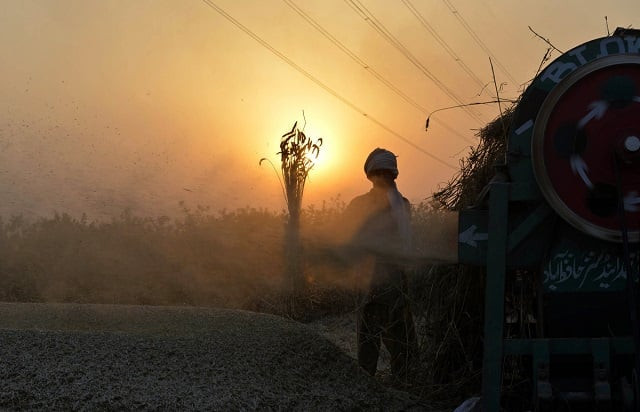Provinces force Centre to raise wheat support price
Sindh fixes Rs4,000 per 40 kilos, Punjab Rs3,900 for same weight

Sindh and Punjab have forced the federal government to raise the wheat support price by setting their own rates which raised serious concerns for the latter.
Sources said that the federal government expressed serious concerns over the wheat support price notified by the two provinces.
The Sindh government notified the support/procurement price of wheat crop 2023 at Rs4,000 per 40 kilos on Feb 9.
Later on, the Punjab government also announced procurement price of wheat crop 2022-23 at Rs3,900 per 40 kilos on Feb 25.
While taking notice of the two different prices, the federal government had also approved a wheat price of Rs4,000 per 40 kilos.
The sources said that federal government had raised serious concerns over different wheat prices, stepping in to set a uniform wheat price to remove hurdles for Pakistan Agricultural Storage and Services Corporation (Passco) in procuring wheat in the two provinces.
In a recent meeting, the Economic Coordination Committee (ECC) of the Cabinet discussed the matter threadbare, observing that there should be uniform price for procurement of wheat in the country.
Read Adviser regrets import of wheat, other produce
However, Punjab and Sindh, which were two major wheat-producing provinces in the country, had fixed different wheat procurement prices in their provinces – Rs3,900 per 40 kilos in Punjab and Rs4,000 per 40 kilos in Sindh.
Therefore, fixing of price below these prices might create a problem for Passco in procuring wheat. It was suggested that the procurement price for Passco be fixed at Rs3,900 per 40 kilos. The ECC agreed to the proposal.
The Ministry of National Food Security and Research informed that wheat was a staple and strategic crop of the country.
In order to ensure its maximum cultivation and to achieve self-sufficiency, the government fixed its minimum support price (MSP)/procurement price to ensure fair return to the farming community as well as to protect public procurement to maintain strategic reserves in the country.
The cost of production of wheat crop 2022-23 worked out by the Agriculture Policy Institute (API) was estimated at Rs2,495 per 40 kilos for the average farmer and Rs2,427 per 40 kilos for the progressive grower.
Therefore, on the basis of cost of production and recommendations of provinces, a summary was submitted to the federal cabinet on Nov 8, 2022 with the recommendation to fix MSP at Rs3,000 per 40 kilos or Rs3,200 per 40 kilos.
However, the matter was still awaiting the federal cabinet’s decision. The Trading Corporation of Pakistan and Passco had reported price of imported wheat at Rs4,500-5,000 per 40 kilos, including inland transportation charges and incidentals of Passco.
Read Wheat seed price reimbursement starts
The Pakistan Bureau of Statistics for the week ended on Feb 23, 2023 reported average wheat prices at the level of Rs4,359 per 40 kilos, comprising Punjab at Rs3,825 per 40 kilos, Sindh at Rs4,198, Khyber-Pakhtunkhwa at Rs4,500 and Balochistan at Rs5,019.
The Ministry of National Food Security and Research informed that the matter was discussed in a meeting convened by the Prime Minister Office Feb 27, 2023.
As per experience of previous years, in order to achieve assigned procurement targets, the provincial governments imposed Section 144, which involved the local administrations to restrict free movement of wheat between their provincial jurisdictions.
These steps not only promoted hoarding and smuggling but also increased wheat prices in the local market.
Therefore, it was appropriate that a uniform procurement price of wheat should be fixed in order to stabilise wheat availability, prices, and free movement across the country.
The Ministry of National Food Security and Research requested the ECC to fix uniform procurement price of wheat crop 2022-23 at the level of Rs4,000 per 40 kilos.
The ECC considered the summary submitted by the Power Division regarding ‘Procurement Price of Wheat Crop 2022-23’, approving the rate of Rs3,900 per 40 kilos.



















COMMENTS
Comments are moderated and generally will be posted if they are on-topic and not abusive.
For more information, please see our Comments FAQ